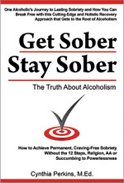How to Quit Drinking Without AA
Yes, it is true, you can learn how to quit drinking without AA. Contrary to popular belief, Alcoholics Anonymous is not the only way. As a matter of fact, it is not even the most effective method for attaining long-term sobriety.
The success rate with AA is less than five percent for long-term recovery, which is described as more than five years of sobriety; but even to attain this requires regular attendance in shame-based meetings and is typically accompanied by constant cravings for alcohol and frequent relapse. So one really questions whether this even fits the definition of recovery. Additionally, after the five years, the success rate drops even lower. Most people do not maintain life-long sobriety.
Treatment programs that employ the use of nutritional support and addressing brain chemistry as I am about to describe enjoy a success rate of between 74 to 90 percent, requires no attendance in meetings, completely eliminates cravings and significantly reduces the incidence of relapse.
This is because AA is completely missing the boat on the roots of alcoholism. Addiction to alcohol is not a spiritual disease, it is a brain disorder, thus why treating it with a 12-step, cult-like, religious program is not very effective.
You are not powerless over alcohol.
Alcohol addiction is not caused by character defects, lack of will power, morals or values.
You do not have to attend AA meetings the rest of your life.
The most important higher power that you need to discover is your brain.
Addiction to alcohol or the inability to quit drinking, develops because of depleted and/or disrupted neurotransmitters in the brain. Primarily dopamine, serotonin, GABA and endorphins, the chemicals in our brain that are responsible for regulating our mood states, thoughts, and actions, as well as pain and stress.
Alcohol overstimulates these neurotransmitters, which tricks the brain into believing they have too many, so the brain quits producing them. This results in depletion and then the brain becomes dependent on alcohol for neurotransmitter function. When alcohol isn't present in the system, then withdrawal is experienced because the brain is lacking in neurotransmitters, thus cravings for alcohol develop to seek relief.
Drinking alcohol temporarily provides relief, as it gives the neurotransmitters a temporary boost, but once the alcohol level drops, so do the neurotransmitters, and thus cravings reappear.
You can quit drinking when brain chemistry is restored to normal and this can be achieved with nutritional supplements and changes in diet and lifestyle. I have written about the roots of addiction and the steps needed for recovery in depth on the following pages. :
Is Alcoholism a Disease?
Understanding Alcohol Addiction
Causes of Alcoholism
Holistic Recovery for Alcoholism
Natural Cures for Alcoholism
Alcoholism Cure
Nutrition and Alcoholism
An Alternative Alcoholism Treatment
A few other facts you should be aware of in regard to the 12-step program
Thoughtful Critique and Analysis of the 12-Step Program of AA
The Truth About Bill Wilson (Bill W.)
The Flaws in Alcoholics Anonymous
How to Stop Drinking Alcohol on Your Own
Alternatively, you can find all this information and much more in one place in my book, Get Sober Stay Sober: The Truth About Alcoholism or my clean and sober self-help program.
The reason you have not been able to learn how to quit drinking without AA is because you were missing these important facts. When you address the true roots of addiction and restore balance to your neurotransmitters, you can attain life-long and craving-free sobriety.
Meetings are not needed because cravings simply cease to exist. Not only that, you also eliminate the anxiety and depression that so often accompany the urge to drink. I know this is true, because I have more than 28 years of uninterrupted and craving-free sobriety by following these principles.
Return from how to quit drinking without aa back to stop drinking alcohol


